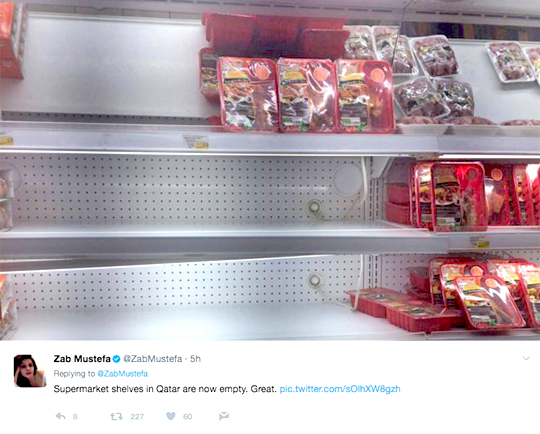Jeddah, Jun 6: Qatar residents on Monday flocked to supermarkets to stock up on food, in response to Saudi Arabia's decision to close the country's sole land border effective early morning.

Social media users reported “panic buying,” with pictures of overflowing shopping carts and empty shelves, after major Gulf states cut diplomatic ties with Doha.
“The severity of the Qatari embargo will depend on its duration,” said John Sfakianakis, director of economic research at the Gulf Research Center (GRC). If this is a prolonged matter, then “this will have a significant impact on tradable goods between the Gulf and Qatar,” the Riyadh-based economist told Arab News.
Thousands of trucks filled with food were stuck at the Saudi-Qatari border and were unable to enter Qatar early on Monday.
Saudi academic Hatoon Al-Fassi, who is based in Doha, said shops were full of people on Monday, but shelves soon emptied. She said it resembled what people would do when on the verge of entering “a state of war.”
“Staff at Georgetown University based here (in Doha) received official statements that they should stock up on food and water,” Al-Fassi, who teaches at Qatar University, told Arab News.
Qatar receives much of its food imports via land from the Kingdom, the only country Qatar shares a land border with. According to a report released by the Future Directions International research institute in 2015, most of Qatar's food imports are shipped through the Strait of Hormuz or across the Saudi border.
With the shutdown of land access from the Kingdom, some expect Qatar to fall short on food products, forcing it to find a substitute.
There will be alternative trading partners for Qatar, but “it could be at a higher cost,” said Sfakianakis. “Qatar could opt to import more goods via its air fleet. It all remains to be seen,” he said.
Sfakianakis added that he does not believe the Saudi import and export industry will be impacted.
Iran said it would provide Qatar with food by sea, the Associated Press reported, citing the semi-official Fars News Agency. The agency quoted Reza Nourani, chairman of the union of exporters of agricultural products, as saying that food shipments sent from Iran can reach Qatar in 12 hours.
Saudi Arabia and the UAE halted exports of white sugar to Qatar, as the fall of diplomatic relations between the countries hit the food trade, Reuters reported on Monday. Qatar is dependent on the Kingdom and the UAE for its white sugar imports, which are estimated to at less than 100,000 tons annually, according to the same report
Qatar, with a population of 2.3 million, was planning to reduce food imports to improve its self-sufficiency in the food industry, as per its National Food Security Program (QNESP) plan, which came into force in 2014. The plan aims to boost domestic food production to supply 40 percent of its food consumption by 2030.







Comments
Add new comment